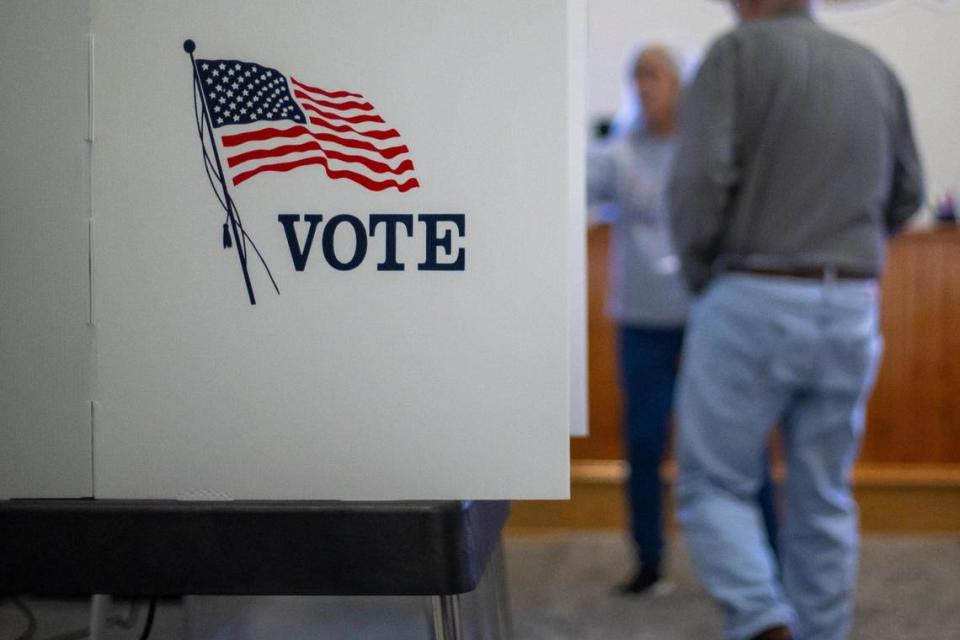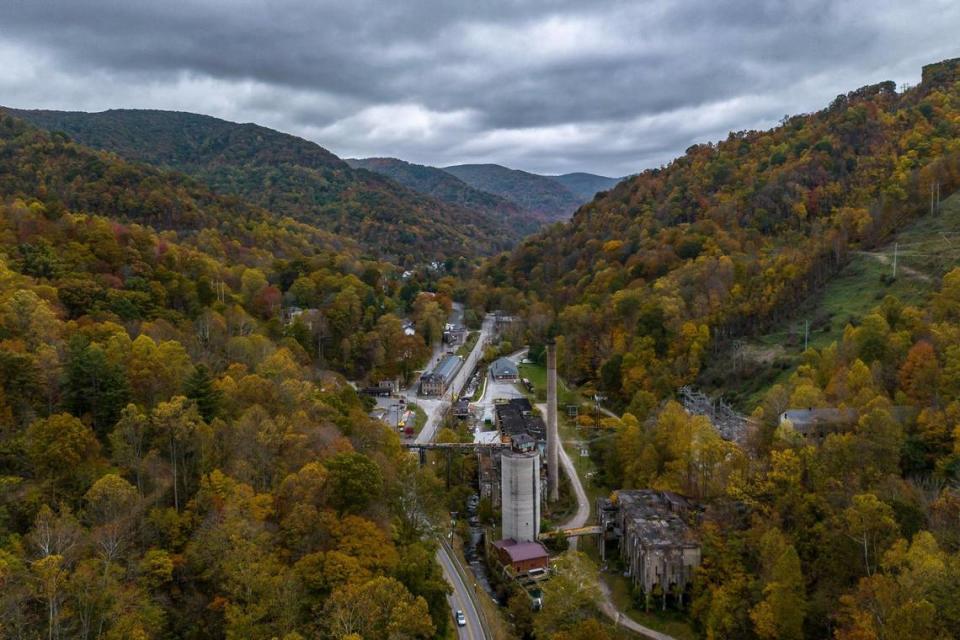For Eastern Kentucky voters, will flood response or ‘conservative’ values matter more?
A week before the Nov. 7 election, the number of political yard signs seen around Letcher County could be counted on fingers. Roadsides, ripe with fall color and blanketed by fog, screamed autumn more than Kentucky’s highly contested governor’s race.
The usually opinionated, breakfast conversations among the old-timers at the Hardee’s in downtown Jenkins — population 1,902 — have tended to veer away from gubernatorial politics, said Todd DePreist, the town’s mayor.
“Nobody’s really saying a whole lot about it either way,” said DePriest, who sometimes drops in on the breakfast conversations at the restaurant, which is next door to City Hall.
“I guess maybe they’re being respectful so it doesn’t start a fight.”
When voters decide Tuesday between the incumbent, Democrat Gov. Andy Beshear, and Republican Daniel Cameron, the state attorney general, the opinions of Eastern Kentuckians — many of whom are still in a disaster recovery process the state government has had a heavy hand in — will loom large.
Turnout in Kentucky’s largely conservative rural areas vote could very well help decide the election, experts have said. Pro-Cameron voters in multiple Appalachian Kentucky counties told the Herald-Leader they admired the Republican’s stance on abortion and were critical of Beshear’s handling of the COVID-19 pandemic.
“I’m a Christian and the way Gov. Beshear closed down churches (during the pandemic), I’m not for that,” said William Amburgey, shortly after voting early at the Knott County courthouse last week.
Those planning to vote for Beshear praised the governor’s presence in the wake of disaster. DePriest said he feels the state government has gone “above and beyond” in being responsive to the needs of the local government in Jenkins after the flood.
Beshear announced a new “high-ground” community near Jenkins two weeks ago.
“I’ve got nothing against Daniel Cameron,” DePriest said. “But I know Andy has been there.”

How did Beshear do in Trump country before?
Once a Democratic stronghold, Eastern Kentucky has been steadily coming under Republican control for much of the past decade. In the coming legislative session, just one Democrat will represent an Eastern Kentucky district in the House.
In the 2020 election, former President Donald Trump carried all 54 of Kentucky’s Appalachian counties — as defined by the Appalachian Regional Commission — with huge margins.
But just a year prior, Beshear narrowly won multiple counties east of I-75, including Breathitt, Magoffin, Knott and Floyd — all of which were part of the 13 counties where a disaster was declared and individuals could receive federal aid following the 2022 floods.
The Eastern Kentucky counties that used to be included in Kentucky’s long-obsolete 7th congressional district — which essentially stretches from Hazard in the south to Ashland in the northeast — will be up for grabs Tuesday night, said Al Cross, a longtime Kentucky political observer and journalist.
“That’s an area that used to be reliably Democratic, but it shifted to Trump and Beshear did much better than (President Joe) Biden in that area,” Cross said.
The heart of that area includes the old district that Rocky Adkins, the well-known former House Majority Leader turned senior Beshear adviser, once represented in the statehouse. The southern stretch of counties includes counties that were hard-hit by the 2022 flood, such as Perry and Breathitt.
“You got to figure (Beshear) is going to do better in those counties than he did in 2019,” Cross said of those hit by the flood.
Statewide turnout will be key to a Cameron victory.
“His whole campaign is designed to turn out the base,” Cross said. “And in this state, because Trump carried it so strongly, you turn out the Trump supporters, you win.”

Will Trump supporters vote for Beshear?
In the spring Republican primary, Cameron outperformed Kelly Craft — who touted her strong connections to the coal industry — in Kentucky’s coal-producing counties. Many Republicans pointed to Trump’s endorsement of Cameron as the deciding factor.
Despite the endorsement, Beshear’s campaign has put a focus on winning over Trump voters, running ads showing Trump supporters who say they plan to vote for Beshear.
Beshear is tied nationwide for the most popular Democratic governor among Trump voters, a recent survey found.
Kem Collins, who had to vacate her home along with her family after last year’s deadly floods, said she is a Trump supporter who plans to vote for Beshear.
“He has pretty much done everything he can to help the flood victims,” Collins said of Beshear.
Collins and her family lived near Jenkins in the community of Dunham before the flood. After the disaster, they lived for a time in travel trailers before moving into a new home constructed by the non-profit HOMES Inc. in September, the Mountain Eagle reported.
Though he already cast a vote for Cameron, Amburgey said he could see the state’s flood response as a boon for Beshear among some flood survivors. His native Knott County suffered 22 of the 45 deaths caused by the July 2022 flood.
“Not so much for me,” Amburgey said, adding that Cameron’s stance on abortion and Beshear’s handling of the pandemic as deciding factors for him.
John Mays, a 45-year resident of Knott County and longtime Democrat who said he voted for Beshear when early voting opened Thursday, also predicted the state’s response to the flood will aid Beshear’s reelection chances.
“He’s done a good job, I think, in the last full year,” Mays said of Beshear. “And with Cameron, you don’t know what you’re getting.”

‘Very conservative people.’
In Harlan County, which borders Letcher to the south, the flood damage was not quite as extreme. The state government’s response to severe flooding may not mean as much to voters there, said Lonnie Riley, a 25-year resident of the county.
Riley, a Christian missionary, moved to the historic coal town of Lynch in the late 1990s and founded the Meridzo Center, which runs multiple ministries locally. He said he plans to vote for Cameron primarily because of Beshear’s ban on mass gatherings, which included churches, at the beginning of the pandemic.
Having the state police take down the license plate numbers of churchgoers was just “foreign to us in Eastern Kentucky,” Riley said, “because we’re very conservative people.”

Terry Tipton, a chaplain for a local rehab center who was eating breakfast at the Lamp House Coffee Shop with Riley, said they were having an in-house worship service on a screened-in porch while people were circling the building “trying to get our license plate numbers.”
“For a lot of I’d say Christian folks, that kind of soured a lot of people,” Tipton said.
Like many small towns in southeastern Kentucky, Lynch was built by the coal industry. But Riley said he hasn’t heard much talk around town about Cameron’s pro-coal statements.
Without backing from the federal government, Riley said many don’t expect the coal industry to return to its historic status as a regional economic engine.
“It’s not going to come back like it was, ever. We know that,” Riley said of the local coal industry.
“We’re just trying to reinvent ourselves as Eastern Kentucky, and we need folks to help us.”


